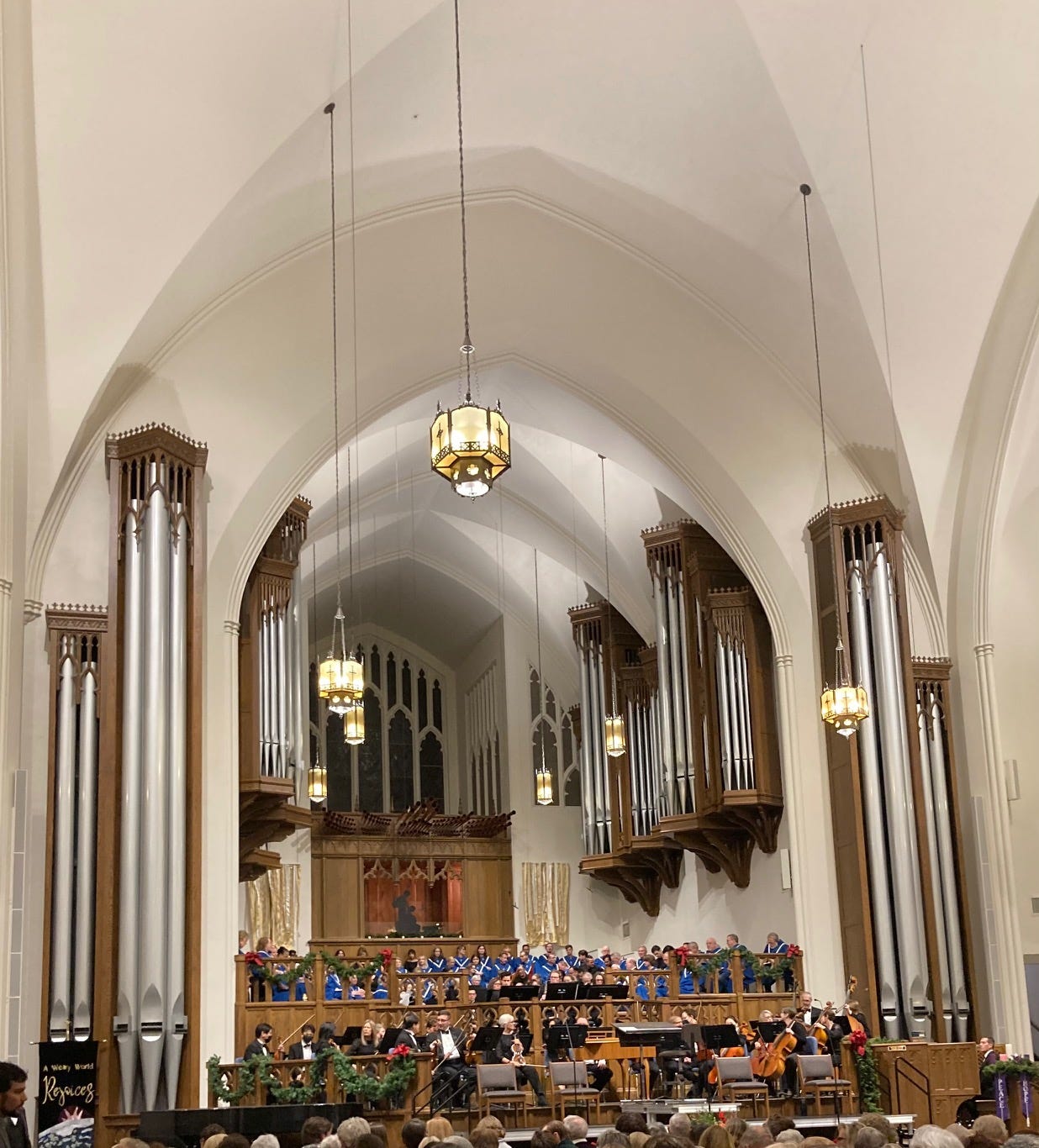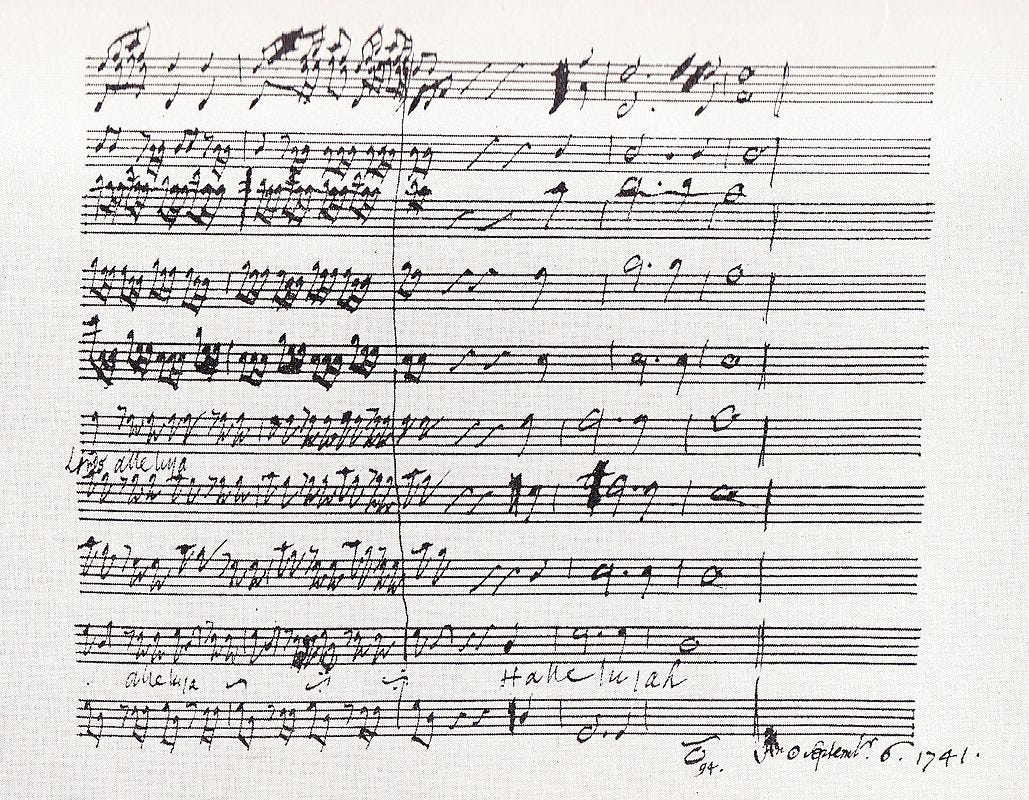The first Sunday in December, I sang Handel’s Messiah next to my sister; her soft, rich alto harmonizing and contrasting with my high soprano notes. Our voices blended and joined with hundreds of others in the airy Neo-gothic church, and the strains of the orchestra were joined by the largest pipe organ in Texas.
Both my sister and I spent many years performing - I in choirs, she in orchestras - so great music is a language we’re both familiar with. But even before the music began, we looked at each other, smiled and said: this is going to be great. The orchestra preparing to play, the weight of the Messiah scores in our hands, the beauty of the building and the energy of so many people all gathered together to hear and to sing one of the world’s most beloved pieces of music: all of our senses were engaged in this one moment in time and we knew we would remember it forever.
We were participating in a “Messiah Sing” — a performance of the Messiah where the audience can sing the chorus part with the choir. If you’ve never attended one, may I recommend it? This link has a compilation of nearly 200 Messiah Sings in the United States, as well as a few in Canada, the UK and elsewhere. It is one of my very favorite Christmas traditions. There is a unique power to singing with a large group in a beautiful space, and when it’s a majestic, brilliant set of songs about the life of Christ, it is transcendent.
I love the Messiah because it is one of the songs of my childhood; I don’t remember the first time I heard it. We listened to it at Easter and at Christmas — and I think there isn’t a day of the year that you couldn’t listen to it. It truly transcends time and place. (My dad once sang the bass solo, “Thus saith the Lord of hosts” with a Kermit the Frog hand puppet for our family, but that is a story for another day).
George Frederic Handel wrote Messiah in an astonishing 24 days in 1741. Understandably, he did little else during those weeks. “He would literally write from morning to night,” said Sarah Bardwell of the Handel House Museum in London.1 Originally an Easter offering, Messiah is divided into three parts: the first part prophecies of the birth of Christ, the second his sacrifice for humankind, and the third section heralds his Resurrection.
On April 13, 1742, the Messiah was performed for the first time in Dublin, Ireland. The performance was anticipated to be so popular that ladies were asked not to wear hoops in their skirts, and men were asked to remove their swords to allow for as many people to attend as possible.2 The proceeds from the ticket sales would go to three charities: prisoners debt relief, a hospital, and a charitable infirmary.3
In one of my favorite details, the money raised from the first performance of Messiah secured the release of 142 indebted prisoners.4 When I read that detail, I couldn’t help but think of the verse in Isaiah:
The Lord hath anointed me to preach good tidings unto the meek; he hath sent me to bind up the brokenhearted, to proclaim liberty to the captives, and the opening of the prison to them that are bound.
-Isaiah 61:1
Whenever I read that verse in Isaiah about Christ, I often think of all the metaphorical prisons he releases us from, the two main ones being sin and death.
The literal release of debtors from prison as a result of the first Messiah performance is perfectly poetic. We shouldn’t wonder at it. To proclaim liberty to the captives — that’s what Jesus does. How beautiful that even the oratorio telling the story of Christ’s life and work also opened prison doors for so many.
Why should anyone listen to the Messiah today? To many it likely seems far too old-fashioned or outdated. It was, after all, written nearly 300 years ago. I love listening to the Messiah for the beautiful music, but I also love listening to it because the verses Handel put to music are some of the most beautiful scriptures we have, many of them from the book of Isaiah. I also love listening to the Messiah because there is no better way to memorize than when you add music to words.
I want my children to hear the Messiah hundreds of times before they leave home so that they can always remember. In our home, we listen so those verses about Christ are written on the hearts of my children — so that they never forget who He is and what He has done for them.
Messiah for Beginners: a How-To
If you’re new to Messiah, please don’t be intimidated by its length. Yes, it is 53 songs, but each one taken individually is very manageable, and most are very short. We have loved using Cindy Rollins’ book which divides it up into short chunks to listen to from December 1-25. I highly recommend using it as a resource if you want to listen to it with your children!
Here are five songs from Messiah that are accessible, easy to listen to, and, in my opinion, the best ones to begin with.
1. Overture (00:00-02:56)
The beautiful orchestral introduction is a great way to get into the style and the feel of the piece.
2. And the glory of the Lord (8:48-11:09)
The text “And the glory of the Lord shall be revealed” is a perfect verse for Christmas, and this scripture (Isaiah 40:5) set to joyful, happy music, is the perfect place to start your Messiah journey.
3. Behold, a virgin shall conceive & O thou that tellest good tidings to Zion (18:12-23:16)
Another beautiful prophesy of Christ’s birth (Behold, a virgin shall conceive and bear a son, and shall call His name Emmanuel, God with us) followed by one of my very favorite songs from Messiah. The lilting, rejoicing tempo is infectious, and we listen to this one on repeat in December.
4. For unto us a child is born (29:25-33:00)
The text speaks for itself in this song: For unto us a child is born, unto us a son is given, and the government shall be upon His shoulder; and His name shall be called Wonderful, Counsellor, the mighty God, the Everlasting Father, the Prince of Peace. This would be a wonderful choice for Christmas morning. It is truly glorious!
5. Pastoral Symphony (33:27-35:37)
I love this piece so much. It’s just instrumental, and the gentle rhythm sounds like the rocking of a cradle; what a perfect way to introduce the Christmas Story (which follows). This would be a lovely song to play while your family is assembling the traditional live nativity with all the children each year on Christmas Eve.
[All timestamps are from this recording of Messiah.]
Above all, remember that listening to unfamiliar music is like learning a foreign language. Repeated listeing engenders affection. If you don’t enjoy it the first time, listen again (and again). The love of the music will come with repetition.
Kandell, Jonathan, “The Glorious History of Handel’s Messiah,” Smithsonian Magazine, Dec 2009, https://www.smithsonianmag.com/arts-culture/the-glorious-history-of-handels-messiah-148168540/
“The Glorious History of Handel’s Messiah”
“Messiah (Handel),” Wikimedia Foundation, last modified Dec 18, 2023, https://en.wikipedia.org/wiki/Messiah_(Handel)
“Messiah (Handel)”






Love this - I sang along with a messiah choir this year for the first time. Life changing
Simply reading the words "And the glory of the Lord" now has those magnificent runs cascading through my head. Messiah Sings are such a joyous experience. Thanks for heightening them with this added background.